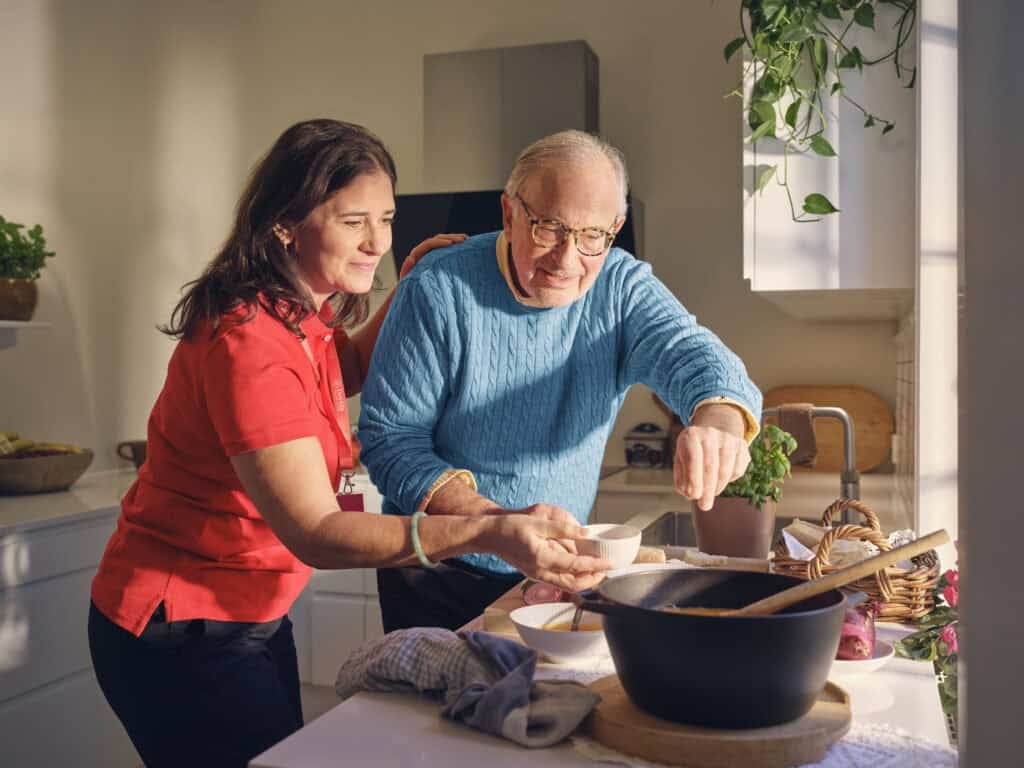Blog
3 September 2025
Safety Without Sacrifice: Maintaining Independence at Home with Dementia
One of the greatest fears families face when dementia is diagnosed is the potential loss of independence and familiar surroundings. However, with proper planning and support, many people with dementia can continue living safely and meaningfully in their own homes.
Understanding Home Safety in Dementia Care
Safety concerns are often the primary reason families consider moving a loved one to residential care. Wandering, falls, medication management, and cooking accidents are real risks that require careful attention. However, these challenges don’t automatically mean home is no longer an option.
The key is understanding that safety in dementia care isn’t about eliminating all risks – it’s about managing risks whilst preserving dignity, autonomy, and quality of life. This balance requires creativity, planning, and often professional support.
Creating a Dementia-Safe Environment
Simple home modifications can significantly improve safety without making the space feel clinical or unfamiliar:
Clear Pathways: Remove clutter, secure loose rugs, and ensure adequate lighting throughout the home. Consider motion-sensor lights for nighttime navigation.
Secure Hazardous Items: Store cleaning products, sharp objects, and medications in locked cabinets. Install safety latches on stoves and consider disconnecting garbage disposals if they pose risks.
Visual Cues and Labels: Use clear labels with both words and pictures on important items like the bathroom door or medicine cabinet. Contrasting colours can help identify important areas.
Technology Solutions: Modern technology offers valuable safety tools, from GPS tracking devices for wandering to medication dispensers with alarms. Smart home systems can monitor activity patterns and alert carers to unusual behaviour.
The Importance of Routine and Familiarity
Maintaining familiar routines provides both safety and comfort. When someone living with dementia follows predictable patterns, carers can better anticipate needs and potential risks. This might mean having meals at the same times each day, following a consistent bedtime routine, or maintaining regular social activities.
Professional dementia carers excel at creating these structured yet flexible routines. They understand how to guide someone through daily activities whilst preserving their sense of autonomy and choice.
Nutrition and Meal Safety
Proper nutrition becomes increasingly important – and challenging – as dementia progresses. People may forget to eat, lose interest in food, or struggle with cooking. Professional carers can ensure regular, nutritious meals whilst involving the person in meal preparation when appropriate.
This might include simple tasks like washing vegetables, setting the table, or choosing between two healthy options. These activities maintain dignity whilst ensuring nutritional needs are met safely.
Social Connection and Community Engagement
Isolation is one of the greatest risks for people with dementia living at home. Maintaining social connections and community engagement isn’t just about quality of life – it’s a crucial safety factor that supports cognitive function and emotional wellbeing.
Professional carers can facilitate continued participation in favourite activities, whether that’s attending church services, visiting the local library, or maintaining friendships. They provide the confidence and support needed to remain engaged with the world beyond home.
Building Your Safety Network
Creating a comprehensive safety plan involves multiple layers of support:
Family Coordination: Regular family meetings to discuss observations, concerns, and care plan adjustments ensure everyone stays informed and involved.
Professional Assessment: Occupational Therapists can evaluate home safety and recommend specific modifications. Healthcare providers should regularly review medications and overall health status.
Emergency Planning: Develop clear protocols for various scenarios, including medical emergencies, severe weather, or carer illness. Ensure multiple people have keys and know the care routine.
Regular Review and Adaptation
Dementia is a progressive condition, which means safety plans must evolve over time. What works today may need adjustment in six months. Regular reviews with all care team members help identify emerging risks and adapt strategies accordingly.
The goal is always to maintain the highest possible quality of life whilst ensuring safety. With proper planning, professional support, and family involvement, home can remain a safe haven throughout much of the dementia journey.
